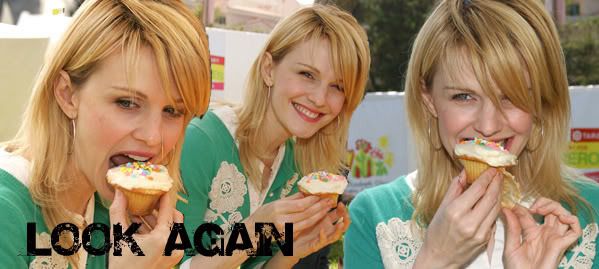Post by Naj on Nov 2, 2007 8:25:59 GMT -5
'Case' star doesn't fear typecasting
Show's global success boosts Morris' options
By KATHY TRACY
Starring in a long-running hit series can present a Dickensian dilemma.
It's the best of times because it provides security for an actor. On the backside, however, it can be the worst of times when future opportunities are limited because the actor has become typecast -- think the "Seinfeld" curse.
"Cold Case" star Kathryn Morris prefers to see the glass half full.
"I'll probably always be associated with Lilly Rush," she acknowledges, "but I had a full career prior to joining the series, working with filmmakers like Rod Lurie and Steven Spielberg."
The decision to commit to a series was based on the assurance by producers Jonathan Littman and Meredith Stiehm that Lilly's story wouldn't "become a soap opera."
"It's such a great opportunity," she says. "She's not one-dimensional. This character just had endless possibilities for such a journey -- to not be perfect and not to be imperfect, but to be imperfectly perfect. That's what I found appealing. ... And I felt that the journey could continue for quite some time."
After 100 episodes, Morris says she was proved right.
"Lilly is a rich character that has spawned many opportunities. There is much more feature interest in me for features due to the show. And I've met a lot more filmmakers and studio heads."
Morris also credits the drama's international appeal for making her more bankable in film.
"The series actually does better internationally than it does here," she notes. "To become a household name in places like Australia, Japan, France, Slovenia and Peru just makes you more valuable. It has widened the net of opportunity for great roles I have access to."
Director Brett Simon, for example, was a "Cold Case" fan who, Morris says, "wanted to see me do something comedic." So he cast her in his indie comedy "Assassination of a High School President," scheduled for release next year.
Although best known for her dramatic roles, Morris has had a varied career. As a child, she and two of her five siblings formed a gospel singing group with their father called the Morris Code. They released two albums and toured. Later, to help pay her way through Temple U., Morris worked as a singing waitress on a cruise ship.
Her breakthrough role was being cast as a fighter pilot in the 1997 syndicated action-adventure drama "Pensacola: Wings of Gold." That led to numerous film roles, including "The Contender" and "Minority Report."
Those bigscreen efforts helped her transition to a network series. One thing that greatly appealed to her about "Cold Case" was its cinematic sensibility.
"I chose to work on a TV series because I knew working with Jerry Bruckheimer was going to be a totally different game than your usual series. Jerry likes to hire movie people both in front of and behind the camera, so you really are making a film-quality TV series."
Despite the time commitment and physical demands of starring in an hour drama, Morris says she has the freedom and energy to pursue other projects during her downtime because "Cold Case" is an efficient and well-run production.
Morris says working on a Bruckheimer series and set has also given her the chance to expand her talents behind the camera. Though she roughly envisions doing "Cold Case" for at least two more years, she recently established Hot Plate Prods., a shingle she says "is cooking up some great ideas for comedy and drama projects.
"It's like Bruckheimer says," she adds. "'How can I create a show that keeps people's fingers off the remote?' Working with Jerry has been a great mentoring experience."
VARIETY
Show's global success boosts Morris' options
By KATHY TRACY
Starring in a long-running hit series can present a Dickensian dilemma.
It's the best of times because it provides security for an actor. On the backside, however, it can be the worst of times when future opportunities are limited because the actor has become typecast -- think the "Seinfeld" curse.
"Cold Case" star Kathryn Morris prefers to see the glass half full.
"I'll probably always be associated with Lilly Rush," she acknowledges, "but I had a full career prior to joining the series, working with filmmakers like Rod Lurie and Steven Spielberg."
The decision to commit to a series was based on the assurance by producers Jonathan Littman and Meredith Stiehm that Lilly's story wouldn't "become a soap opera."
"It's such a great opportunity," she says. "She's not one-dimensional. This character just had endless possibilities for such a journey -- to not be perfect and not to be imperfect, but to be imperfectly perfect. That's what I found appealing. ... And I felt that the journey could continue for quite some time."
After 100 episodes, Morris says she was proved right.
"Lilly is a rich character that has spawned many opportunities. There is much more feature interest in me for features due to the show. And I've met a lot more filmmakers and studio heads."
Morris also credits the drama's international appeal for making her more bankable in film.
"The series actually does better internationally than it does here," she notes. "To become a household name in places like Australia, Japan, France, Slovenia and Peru just makes you more valuable. It has widened the net of opportunity for great roles I have access to."
Director Brett Simon, for example, was a "Cold Case" fan who, Morris says, "wanted to see me do something comedic." So he cast her in his indie comedy "Assassination of a High School President," scheduled for release next year.
Although best known for her dramatic roles, Morris has had a varied career. As a child, she and two of her five siblings formed a gospel singing group with their father called the Morris Code. They released two albums and toured. Later, to help pay her way through Temple U., Morris worked as a singing waitress on a cruise ship.
Her breakthrough role was being cast as a fighter pilot in the 1997 syndicated action-adventure drama "Pensacola: Wings of Gold." That led to numerous film roles, including "The Contender" and "Minority Report."
Those bigscreen efforts helped her transition to a network series. One thing that greatly appealed to her about "Cold Case" was its cinematic sensibility.
"I chose to work on a TV series because I knew working with Jerry Bruckheimer was going to be a totally different game than your usual series. Jerry likes to hire movie people both in front of and behind the camera, so you really are making a film-quality TV series."
Despite the time commitment and physical demands of starring in an hour drama, Morris says she has the freedom and energy to pursue other projects during her downtime because "Cold Case" is an efficient and well-run production.
Morris says working on a Bruckheimer series and set has also given her the chance to expand her talents behind the camera. Though she roughly envisions doing "Cold Case" for at least two more years, she recently established Hot Plate Prods., a shingle she says "is cooking up some great ideas for comedy and drama projects.
"It's like Bruckheimer says," she adds. "'How can I create a show that keeps people's fingers off the remote?' Working with Jerry has been a great mentoring experience."
VARIETY




















 ..........
.......... ..........
.......... ...........
...........



